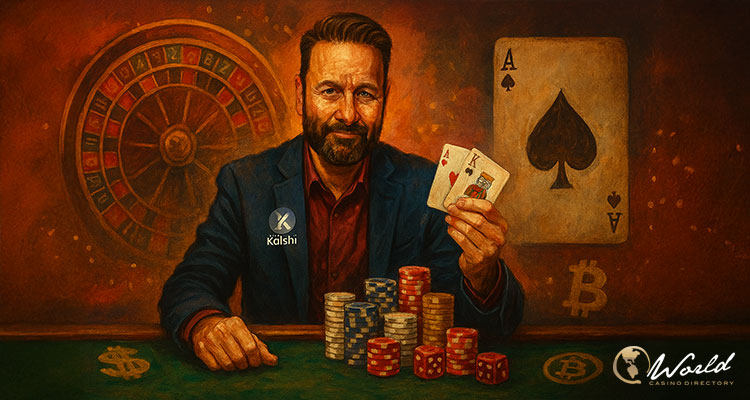Poker icon Daniel Negreanu, known worldwide as “Kid Poker,” has become the newest ambassador for Kalshi, the U.S.-based prediction market platform that lets users trade contracts on real-world events. The announcement, made Tuesday by Kalshi CEO Tarek Mansour, links one of poker’s most recognizable figures with a company navigating both rapid growth and mounting legal disputes.
Mansour, cited by Finance Magnates, highlighted similarities between Negreanu’s career setbacks and Kalshi’s regulatory battles. “Kalshi’s fight for prediction markets has followed a similar path,” he wrote. “We have failed and been rejected more times than I can remember, but we did not waver in our commitment to the vision. Expand the world of financial markets, no matter the cost, no matter the hardship.”
Negreanu, a Poker Hall of Famer with over $56 million in live tournament winnings and seven World Series of Poker bracelets, said he had been using the platform privately for some time. “I’m stoked because I’ve sort of been holding this for a while because I’ve been playing on Kalshi for quite a while,” he told PokerNews.
Trading, Not Gambling?
Kalshi markets itself as a regulated trading exchange, not a sportsbook, offering binary “Yes/No” contracts on subjects ranging from politics and economics to sports and pop culture. Contracts can be bought and sold before or during events, and unlike traditional betting sites, Kalshi claims to impose no limits on winning accounts.
Negreanu has been quick to emphasize that distinction. “It’s not a sportsbook. Meaning you can get better odds. You won’t get limited for winning too much. And you can trade in and out of positions even within games. And because it’s a trading market, it’s available in all 50 states,” he explained in a video announcing his partnership.
He also shared his enthusiasm for the variety of markets, citing examples from football wagers to quirky questions like, “Will Trump ban lab-grown meat by the end of the year? I bet no, but I had to lay a big price.” For him, the fun lies in following the market swings, not just the financial outcome.
Critics, however, see Kalshi’s alignment with a poker professional as reinforcing the argument that prediction markets closely resemble gambling. Massachusetts Attorney General Andrea Joy Campbell, who recently filed a lawsuit against Kalshi, argued: “Sports wagering comes with significant risk of addiction and financial loss and must be strictly regulated to mitigate public health consequences.”
Legal Hurdles Grow
Kalshi’s expansion has drawn regulatory fire across multiple states. Lawsuits in Nevada and New Jersey accused the platform of operating as an unlicensed sportsbook, though federal judges sided with Kalshi in those cases. Maryland’s regulators, however, ruled against the company, though operations there continue pending appeal. Massachusetts has now taken the most aggressive stance, seeking to block Kalshi’s sports contracts entirely.
The legal fight has intensified as Robinhood, one of Kalshi’s distribution partners, revealed that approximately $1 billion in contracts were traded through its app in just the second quarter. Robinhood has since filed federal lawsuits to prevent Massachusetts from enforcing state gambling laws against prediction markets.
Additional challenges have come from tribal authorities, such as the Ho-Chunk Nation in Wisconsin, which sued both Kalshi and Robinhood in August, claiming that federally overseen prediction markets infringe upon tribal sports betting rights.
Negreanu’s Role and Future Possibilities
As part of his ambassador duties, Negreanu is offering fans a chance to win a $26,000 seat in the WSOP Paradise Super Main Event in December, along with nine nights at Atlantis and other perks, through a promotional giveaway tied to his signup code.
The Canadian-born star is also integrating Kalshi into his streaming content, showing fans how he trades on markets day to day. His involvement could pave the way for poker-related prediction markets in the future. Negreanu himself has floated the idea of markets tied to events like whether GGPoker tournaments hit their guarantees or who wins Player of the Year.
“What do poker players like to do? We like to make prop bets on a wide variety of different goofy markets that we come up with, right? And there’s a whole bunch here,” he noted, suggesting poker-themed contracts could one day appear on Kalshi.
Star Power Meets Regulatory Uncertainty
Kalshi reports more than a million users and over $2 billion in trades across its markets, underscoring how fast the platform has grown since launching sports contracts. The Commodity Futures Trading Commission (CFTC), which originally granted Kalshi approval, has not yet taken a public stance on the company’s recent expansions and even canceled a scheduled roundtable on prediction markets earlier this year.
Negreanu’s global recognition and crossover appeal could help Kalshi attract poker fans and casual traders alike. Yet, his presence also sharpens the debate: whether prediction markets represent a new form of financial instrument or a repackaged version of sports betting that states argue should fall under gambling laws. For now, Kalshi continues to operate nationwide, leaning on its message of “trading” while facing mounting lawsuits.



